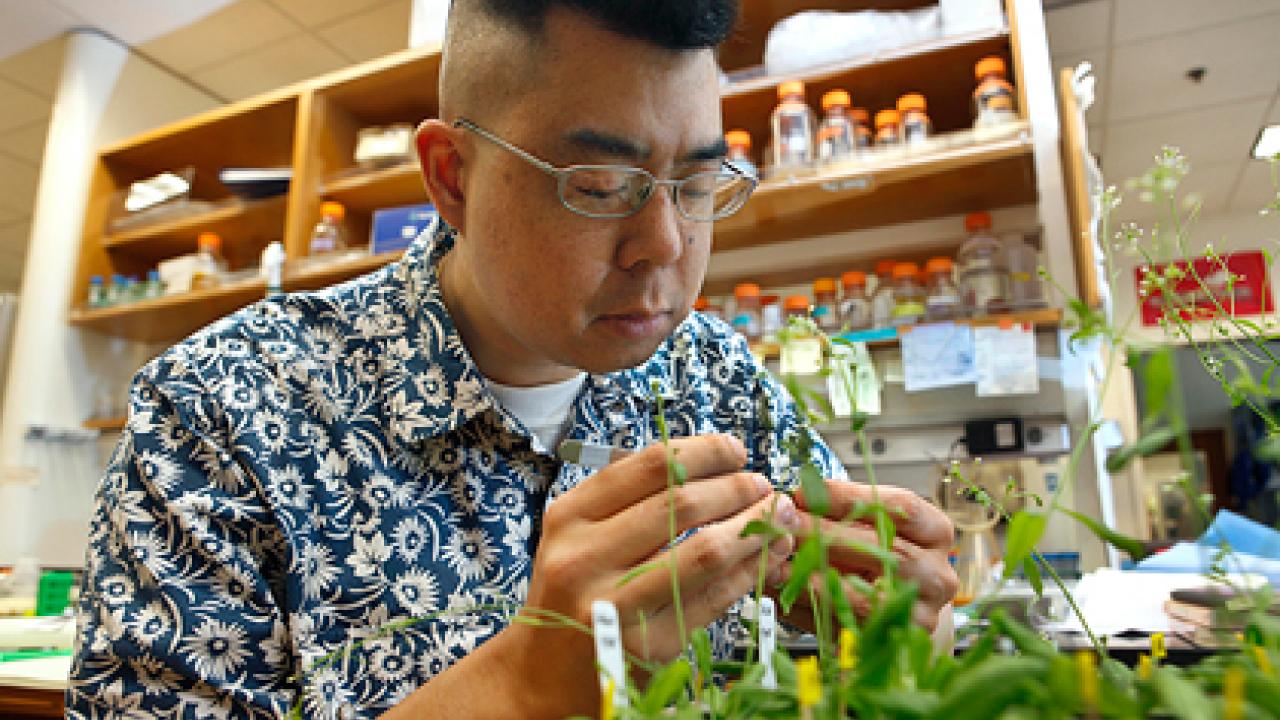Simon Chan, an associate professor of plant biology at the University of California, Davis, whose work on plant breeding promised to help some of the world's poorest people, died Aug. 22. He was 38.
Chan had been suffering from primary sclerosing cholangitis, an autoimmune disorder, and developed complications while awaiting a liver transplant.
"Simon was an incredible scientist, superb mentor and a great friend," said James Hildreth, dean of the College of Biological Sciences at UC Davis. "His brilliant work could fundamentally change how new crop plants are generated and may shed light on how new plant species are formed."
Professor Bill Lucas, chair of the Department of Plant Biology, described Chan as "one of a kind."
“His enthusiasm for his science was contagious and his passion for teaching and mentoring his students served as a true role model for us all. Words cannot express our deep sorrow at losing such a talented and wonderful human being,” Lucas said.
Working with the model plant Arabidopsis, Chan's laboratory discovered a way to breed plants with genes from only one parent, making it possible to "breed true" without generations of inbreeding.
In June 2011, Chan was one of two UC Davis scientists selected for the first-ever class of HHMI-GBMF Investigators, funded jointly by the Howard Hughes Medical Institute and the Gordon and Betty Moore Foundation to support promising research in plant sciences. (The other awardee was Jorge Dubcovsky, professor of plant sciences.)
Chan planned to use the HHMI-GBMF award to expand his work to crop plants such as tomatoes and Chinese cabbage.
Chan was also working with plant breeders in Colombia, Tanzania and Kenya to find new ways to breed bananas, plantain and cassava, staple foods for millions of the world's poorest people. That project was supported by a grant from the NSF-BREAD (Basic Research to Enable Agricultural Development) program, a joint initiative of the Bill & Melinda Gates Foundation and the National Science Foundation.
Chan was born in 1974 in Auckland, New Zealand, and earned his bachelor's degree in biochemistry from the University of Auckland in 1996. From there he went to UCSF, where he worked with Professor Elizabeth Blackburn, winner of the 2009 Nobel Prize in physiology or medicine, and was awarded his doctoral degree in cell biology in 2002.
Chan carried out postdoctoral research at UCLA, where he began working on plants with Professor Steven Jacobsen in the Department of Molecular, Cell and Developmental Biology. Chan joined the faculty at UC Davis in 2006 as an assistant professor. In June 2012 he had been granted tenure and promoted to associate professor.
Friends and colleagues recalled that Chan loved music, especially jazz. He played bass guitar and saxophone. As a teenager he dreamed of being a professional musician, but settled on science instead.
"We will all miss Simon so much," wrote Neelima Sinha, professor of plant biology at UC Davis. "He was a wonderful colleague, a rare intellect, and such a great friend. Will miss his enthusiasm for science, life, music, movies, food, people and the world in general."
Wrote Keith Bradnam, a project scientist at the UC Davis Genome Center, via Twitter: "It sounds a cliché, but I don't think there is anyone who would have a bad word to say about Simon. He was respected and loved by all who knew him."
Chan is survived by his parents, Avril and Robert Chan, his sister, Caron Chan, and her husband and two children.
A memorial service is set for Thursday, Aug. 30, 3 p.m. at the Buehler Alumni and Visitors Center on the UC Davis campus. More information here.
Media Resources
Andy Fell, Research news (emphasis: biological and physical sciences, and engineering), 530-752-4533, ahfell@ucdavis.edu
